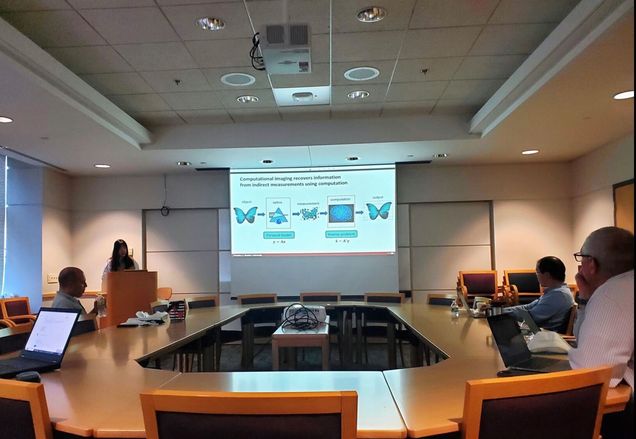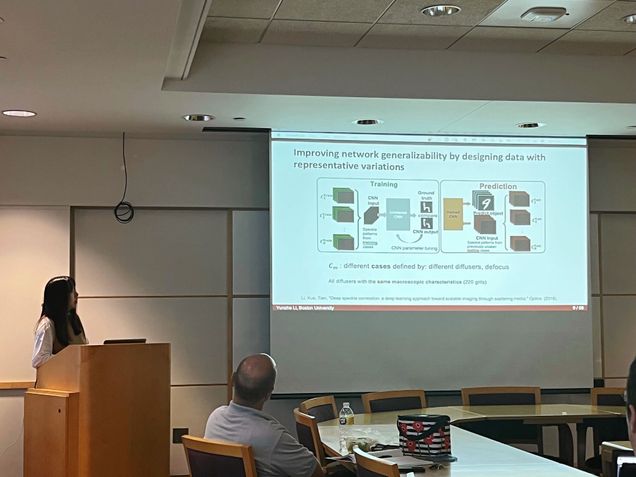Yunzhe defended PhD Dissertation!


Title: Robust Deep Learning for Computational Imaging through Random Optics
Presenter: Yunzhe Li
Date: Monday, September 26, 2022
Time: 12:00 pm to 2:00 pm
Location: 8 Saint Mary’s Street, Room 339
Advisor: Professor Lei Tian, ECE
Chair: Professor Eshed Ohn-Bar, ECE
Committee: Professor Lei Tian, ECE; Professor Vivek Goyal, ECE; Professor Luca Dal Negro, ECE; Professor Roberto Paiella, ECE.
Abstract: Light scattering is a pervasive phenomenon that poses outstanding challenges in both coherent and incoherent imaging systems. The output of a coherent light scattered from a complex medium exhibits a seemingly random speckle pattern that scrambles the useful information of the object. To date, there is no simple solution for inverting such complex scattering. Advancing the solution of inverse scattering problems could provide important insights into applications across many areas, such as deep tissue imaging, non-line-of-sight imaging, and imaging in degraded environment. On the other hand, in incoherent systems, the randomness of scattering medium could be exploited to build lightweight, compact, and low-cost lensless imaging systems that are applicable in miniaturized biomedical and scientific imaging. The imaging capability of such computational imaging systems, however, are largely limited by the ill-posed or ill-conditioned inverse problems, which typically causes imaging artifacts and degradation of the image resolution. Therefore, mitigating this issue by developing modern algorithms is essential for pushing the limits of such lensless computational imaging systems.
In this thesis, I focus on the problem of imaging through random optics and present two novel deep-learning (DL) based methodologies to overcome the challenges in coherent and incoherent systems: 1) no simple solution for inverse scattering problem and lack of robustness to scattering variations; and 2) ill-posed problem for diffuser-based lensless imaging.
In the first part, I demonstrate the novel use of a deep neural network (DNN) to solve the inverse scattering problem in a coherent imaging system. I propose a statistical `one-to-all’ deep learning technique that encapsulates a wide range of statistical variations for the model to be resilient to speckle decorrelations. I push the limit of robustness against a broad class of perturbations including scatterer change, displacements, and system defocus up to 10X depth of field.
In the second part, I consider the utility of the random light scattering to build a diffuser-based computational lensless imaging system and present a generally applicable novel DL framework to achieve fast and noise-robust color image reconstruction. I developed a diffuser-based computational funduscope that reconstructs important clinical features of a model eye. Experimentally, I demonstrated fundus image reconstruction over a large field-of-view (FOV) and robustness to refractive error using a constant point-spread-function. Next, I present a physics simulator-trained, adaptive DL framework to achieve fast and noise-robust color imaging. The physics simulator incorporates optical system modeling, the simulation of mixed Poisson-Gaussian noise, and color filter array induced artifacts in color sensors. The learning framework includes an adaptive multi-channel L2-regularized inversion module and a channel-attention enhancement network module. Both simulation and experiments show consistently better reconstruction accuracy and robustness to various noise levels under different light conditions compared with traditional L2-regularized reconstructions.
Overall, this thesis investigated two major classes of problems in imaging through random optics. In the first part of the thesis, my work explored a novel DL-based approach for solving the inverse scattering problem and paves the way to a scalable and robust deep learning approach to imaging through scattering media. In the second part of the thesis, my work developed a broadly applicable adaptive learning-based framework for ill-conditioned image reconstruction and a physics-based simulation model for computational color imaging.